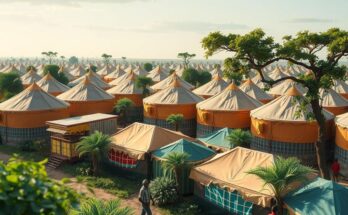Dr. Clovis Paulin Baramburiye is Burundi’s first plastic surgeon, holding the significant responsibility of pioneering this specialty in the nation. After overcoming challenges in his education and training, he offers vital surgical procedures to patients facing severe medical conditions, while advocating for improved resources in healthcare. His work reflects advancements in surgical training and highlights the importance of technology in transforming healthcare in Burundi.
Dr. Clovis Paulin Baramburiye is recognized as the first plastic and reconstructive surgeon in Burundi, a position he describes as both an honor and a significant responsibility due to the pressure of being the sole practitioner in the nation. His pathway to this specialty was fraught with challenges; after completing his medical studies in China, he returned to Burundi to teach human anatomy at the University of Burundi. With no local training program for plastic surgery and prohibitive costs for studying abroad, he initially trained in general surgery.
A pivotal moment in Dr. Baramburiye’s career came when he secured a scholarship to pursue plastic surgery. Though this meant abandoning years of general surgery training, he embraced the opportunity. He trained in Rwanda for three years before successfully completing his final examinations in Zimbabwe, earning recognition as a plastic surgeon in December 2023.
Currently, Dr. Baramburiye engages in various professional activities, including teaching at the University of Burundi, overseeing the Department of Human Anatomy, and serving as a consultant at the University Hospital. His surgical work extends beyond purely cosmetic procedures, addressing critical medical issues such as severe burns, cleft lips, and soft tissue infections.
He faces challenges stemming from limited medical equipment and time constraints in the operating room. “For most reconstructive surgeries, basic instruments can work. But for cases like cleft palate, you need special retractors and calipers. Sometimes I’m challenged by these instruments, but I’m advocating to get what I need so I can do proper work,” he remarked, highlighting the need for better resources.
Despite his challenges, Dr. Baramburiye finds his work deeply fulfilling, especially as he witnesses his patients regain hope through surgical interventions that were not previously available. He emphasizes that even simple procedures can significantly impact patients’ lives. He also recognizes the potential of technology and Artificial Intelligence in revolutionizing healthcare in Burundi, stating, “AI will play a big role. I was impressed by a software used in Rwanda to assess the severity of cleft cases. I think AI is going to make our lives way easier, but we need to handle it properly.”
Dr. Baramburiye also addresses the shortage of doctors in rural areas, presenting it as a major obstacle in providing healthcare across the country. He advocates for improved remuneration, equipment, and support to give medical professionals a sustainable living while assisting patients. He commends the advancements in surgical training across Africa, noting that specialization is now possible through initiatives like the College of Surgeons of East & Central and Southern Africa (COSECSA).
In looking to the future, Dr. Baramburiye believes that enhancing the provision of necessary tools for doctors is crucial for the advancement of healthcare in Burundi. He hopes that more young professionals will be inspired to pursue their dreams, following in his footsteps.
Dr. Clovis Paulin Baramburiye’s achievements as Burundi’s first plastic surgeon exemplify significant progress in the country’s healthcare landscape. He not only addresses complex medical challenges but also advocates for better resources and training for healthcare professionals. His commitment to patient care and the advancement of surgical training is paving the way for a brighter future in healthcare within Burundi. Ensuring doctors have access to essential tools remains vital for the ongoing improvement of the healthcare system.
Original Source: globalsouthworld.com




